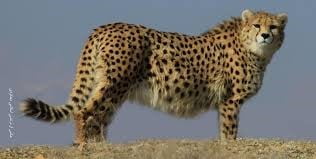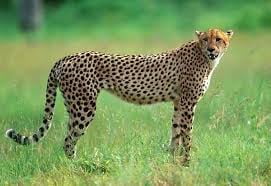Environment & Ecology
Context: The Union Environment Ministry stated that India is set to bring cheetahs from South Africa to Madhya Pradesh’s Kuno-Palpur National Park by August this year.
- The cheetah is the only large carnivore to have gone extinct in India, primarily due to hunting and habitat loss.
- Maharaja Ramanuj Pratap Singh Deo of Korea, Madhya Pradesh, is widely believed to have killed the last three recorded cheetahs in India in 1947.
- In 1952, the Indian government officially declared the Cheetah extinct in the country.
Extiction
Hunting with the cheetahs
- For centuries, hunting was a favoured activity for royalty in India.
- The cheetah, which was relatively easy to tame and less dangerous than tigers, was frequently used by Indian nobility for sport-hunting.
- The earliest available record for cheetahs being used for hunts in India, comes from the 12th century Sanskrit text Manasollasa, which was produced by the Kalyani Chalukya ruler, Someshvara III (reigned from 1127-1138 CE).
- Cheetah coursing, or the use of trained cheetahs for hunting, had become a highly specialized activity in the medieval period and was carried out on a large scale during the Mughal Empire.
- Emperor Akbar, who reigned from 1556-1605, was particularly fond of the activity and is recorded to have collected 9,000 cheetahs in total.
- The demand for cheetahs for hunting purposes was so high that specific areas, which had a high population, were designated for their capture, such as Rajasthan’s Jodhpur and Jhunjhunu, Punjab’s Bathinda and Haryana’s Hisar.
- The capture of wild cheetahs for hunting and the difficulty to breed them in captivity was leading to a decline in the cheetah population, even before the entry of the British.
Near extinction under the British Raj
- Unlike the Mughals, the British were not very interested in coursing with the cheetahs.
- Rather, they preferred to hunt big game, such as tigers, bison and elephants.
- While tigers were the choice animals for the British shikar, Indian and British “sport” hunters also targeted cheetahs.
- There is evidence to suggest that British officials considered the animal as “vermin” and also distributed monetary rewards for the killing of cheetahs from at least 1871 onwards.
- The rewards for bounty hunting likely caused the decline of cheetahs, as even the removal of a small number would have negatively affected the ability of wild cheetahs to reproduce even at the lowest level required for survival.
- As a result, wild cheetahs became very rare in India by the 20th century.
International trade of cheetahs
- Unlike the British, Indian elites and rulers of princely states continued the old practice of hunting with cheetahs in the 1920s.
- However, by this time it had become increasingly difficult to find cheetahs in the wild.
Cheetah
- The cheetah is one of the oldest of the big cat species, with ancestors that can be traced back more than five million years to the Miocene era.
- The cheetah is also the world’s fastest land mammal that lives in Africa and Asia
| Features | Asiatic Cheetah | African Cheetah |
| Physical Characteristics | Smaller and paler than the African cheetah. Has smaller head and a longer neck. Usually have red eyes and they have a more cat-like appearance. | Bigger in size as compared to Asiatic Cheetah.
|
| Image |  |
 |
| Distribution | Around 40-50 found only in Iran. | Around 6,500-7,000 African cheetahs present in the wild. |
| Status | IUNCN: Critically Endangered
CITES: Appendix-I of the List |
IUNCN: Vulnerable
CITES: Appendix-I of the List |
Previous Year Questions
Q.1) Consider the following statements: (2019)
- Asiatic lion is naturally found in India only.
- Double-humped camel is naturally found in India only.
- One-horned rhinoceros is naturally found in India only.
Which of the statements given above is/are correct?
- 1 only
- 2 only
- 1 and 3 only
- 1, 2 and 3
Source: Indian Express













